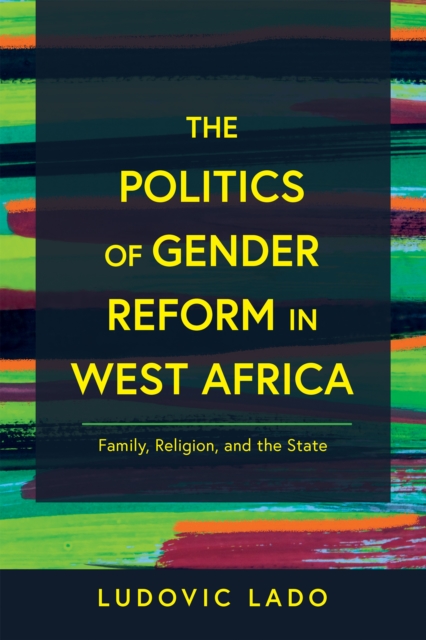The Politics of Gender Reform in West Africa: Family, Religion, and the State

The Politics of Gender Reform in West Africa: Family, Religion, and the State
This anthropological study offers a crucial contribution to scholarly debates about the making of African modernity by considering the implementation and reception of gender reform in the West African context.
Historically, attempts at implementing gender reform in West Africa have been met with suspicion. Beyond the perception that such reforms subvert traditional structures of authority and community, many worry that these efforts are inextricably connected to Western imperialism and colonialism. Ludovic Lado's The Politics of Gender Reform in West Africa examines the politics of a legislative process entirely driven by the state and meant to narrow the gender gap in Ivorian society.
Lado discusses the legislative processes by which states have sought to reduce the gender gap between men and women, probes the potential impact of this reform on the condition of women by exploring the practice of civil marriage in Abidjan, and assesses the reception of the reform among Catholics and Muslims in Côte d'Ivoire. Throughout this readable and engaging study, Lado examines how the relationship between secular powers and religious authorities has determined the direction gender reforms have taken. Although the predominant focus in this text remains on gender reforms in Côte d'Ivoire, Lado also discusses their correlates in Niger, Senegal, and Mali. He shows that the success or failure of gender reforms in West Africa has relied on the interaction of various power relationships that structure the international, national, local, religious, and domestic arenas within which West Africans go about their lives. The book concludes with an informed reflection on the relationship among religions, the state, and gender reforms that highlights some of the issues at stake in the domestication of hegemonic modernity in Africa.
PRP: 620.00 Lei
Acesta este Prețul Recomandat de Producător. Prețul de vânzare al produsului este afișat mai jos.
558.00Lei
558.00Lei
620.00 LeiLivrare in 2-4 saptamani
Descrierea produsului
This anthropological study offers a crucial contribution to scholarly debates about the making of African modernity by considering the implementation and reception of gender reform in the West African context.
Historically, attempts at implementing gender reform in West Africa have been met with suspicion. Beyond the perception that such reforms subvert traditional structures of authority and community, many worry that these efforts are inextricably connected to Western imperialism and colonialism. Ludovic Lado's The Politics of Gender Reform in West Africa examines the politics of a legislative process entirely driven by the state and meant to narrow the gender gap in Ivorian society.
Lado discusses the legislative processes by which states have sought to reduce the gender gap between men and women, probes the potential impact of this reform on the condition of women by exploring the practice of civil marriage in Abidjan, and assesses the reception of the reform among Catholics and Muslims in Côte d'Ivoire. Throughout this readable and engaging study, Lado examines how the relationship between secular powers and religious authorities has determined the direction gender reforms have taken. Although the predominant focus in this text remains on gender reforms in Côte d'Ivoire, Lado also discusses their correlates in Niger, Senegal, and Mali. He shows that the success or failure of gender reforms in West Africa has relied on the interaction of various power relationships that structure the international, national, local, religious, and domestic arenas within which West Africans go about their lives. The book concludes with an informed reflection on the relationship among religions, the state, and gender reforms that highlights some of the issues at stake in the domestication of hegemonic modernity in Africa.
Detaliile produsului










